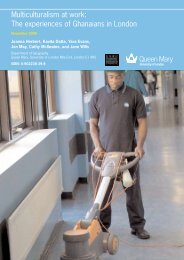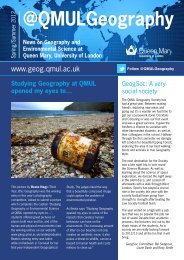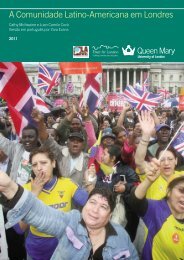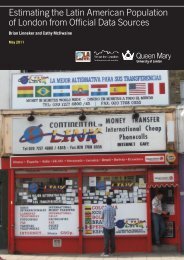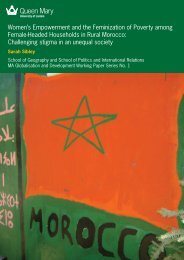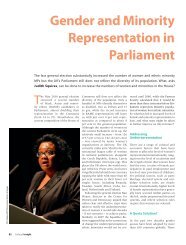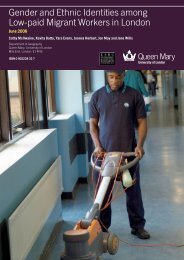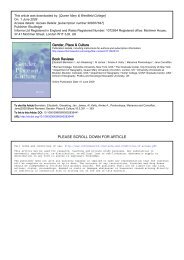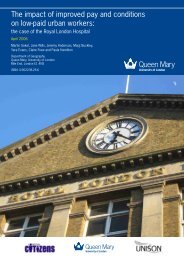The Colombian community in London - Geography - Queen Mary ...
The Colombian community in London - Geography - Queen Mary ...
The Colombian community in London - Geography - Queen Mary ...
- No tags were found...
You also want an ePaper? Increase the reach of your titles
YUMPU automatically turns print PDFs into web optimized ePapers that Google loves.
<strong>Colombian</strong>s who had arrived more recently were more likely to live <strong>in</strong> multi-person or s<strong>in</strong>gle<br />
person households, rather than family households. For example, more than half of those who<br />
arrived s<strong>in</strong>ce 2000 lived <strong>in</strong> multi-person households or s<strong>in</strong>gle person households. Multi-person<br />
and lone person households also tend to be associated with low <strong>in</strong>comes and economic<br />
vulnerability. 28% of elementary workers lived <strong>in</strong> s<strong>in</strong>gle person households with a further 19%<br />
liv<strong>in</strong>g <strong>in</strong> multi-person units. In contrast, those who are settled are more likely to live <strong>in</strong><br />
households compris<strong>in</strong>g couples and children. As such, more than half of people liv<strong>in</strong>g <strong>in</strong> these<br />
households arrived before 1999, compared with 39% who arrived after 2000.<br />
Figure 11: Household structures among <strong>Colombian</strong>s<br />
Couple with dependent<br />
children<br />
Couple with no<br />
dependent children<br />
Lone parent with<br />
dependent children<br />
One person household<br />
Other multi-person<br />
household<br />
Source: Questionnaire survey (N=100)<br />
Transformations <strong>in</strong> gender relations and ideologies<br />
Gender relations and ideologies (referr<strong>in</strong>g to the norms and ideals about expected behaviour<br />
between women and men as well as the roles that are deemed appropriate for people<br />
because of their gender) among <strong>Colombian</strong>s change accord<strong>in</strong>g to pre- and post-migration<br />
experiences with both positive and negative outcomes (see also McIlwa<strong>in</strong>e, 2010; McIlwa<strong>in</strong>e<br />
and Carlisle, 2011). Draw<strong>in</strong>g on the qualitative research, many younger migrants felt that<br />
changes <strong>in</strong> gender relations had occurred back home before they migrated. For example, 29<br />
year-old Sara from Bucaramanga (<strong>in</strong>terviewed <strong>in</strong> 2007) and who had been an eng<strong>in</strong>eer with a<br />
cattle-farm<strong>in</strong>g company noted: „I always saw my father support<strong>in</strong>g my mother who was a really<br />
hard worker; he always let her work. With<strong>in</strong> my family, the husbands help the wives <strong>in</strong> the<br />
same way as they do here.‟<br />
Although women and men‟s experiences <strong>in</strong> the labour market <strong>in</strong>fluenced how gender relations<br />
and ideologies transformed (see earlier), changes at the household level were also identified.<br />
On one hand, people spoke of men contribut<strong>in</strong>g more to domestic labour <strong>in</strong> the home than<br />
they did <strong>in</strong> Lat<strong>in</strong> America. This was usually prompted by work<strong>in</strong>g practices outside the home;<br />
<strong>in</strong> cases with both partners work<strong>in</strong>g often long and irregular hours, people had to share<br />
housework such as cook<strong>in</strong>g. Maya, who was 38 years old and from Palmira (<strong>in</strong>terviewed <strong>in</strong><br />
2010) noted:<br />
„Here, we both have to contribute at home. He [her husband] never used to help <strong>in</strong><br />
Colombia, not even wash a dish, but here he has no choice, we both work. I don‟t th<strong>in</strong>k<br />
he has changed what he really th<strong>in</strong>ks, but he can‟t compla<strong>in</strong>‟.<br />
25



